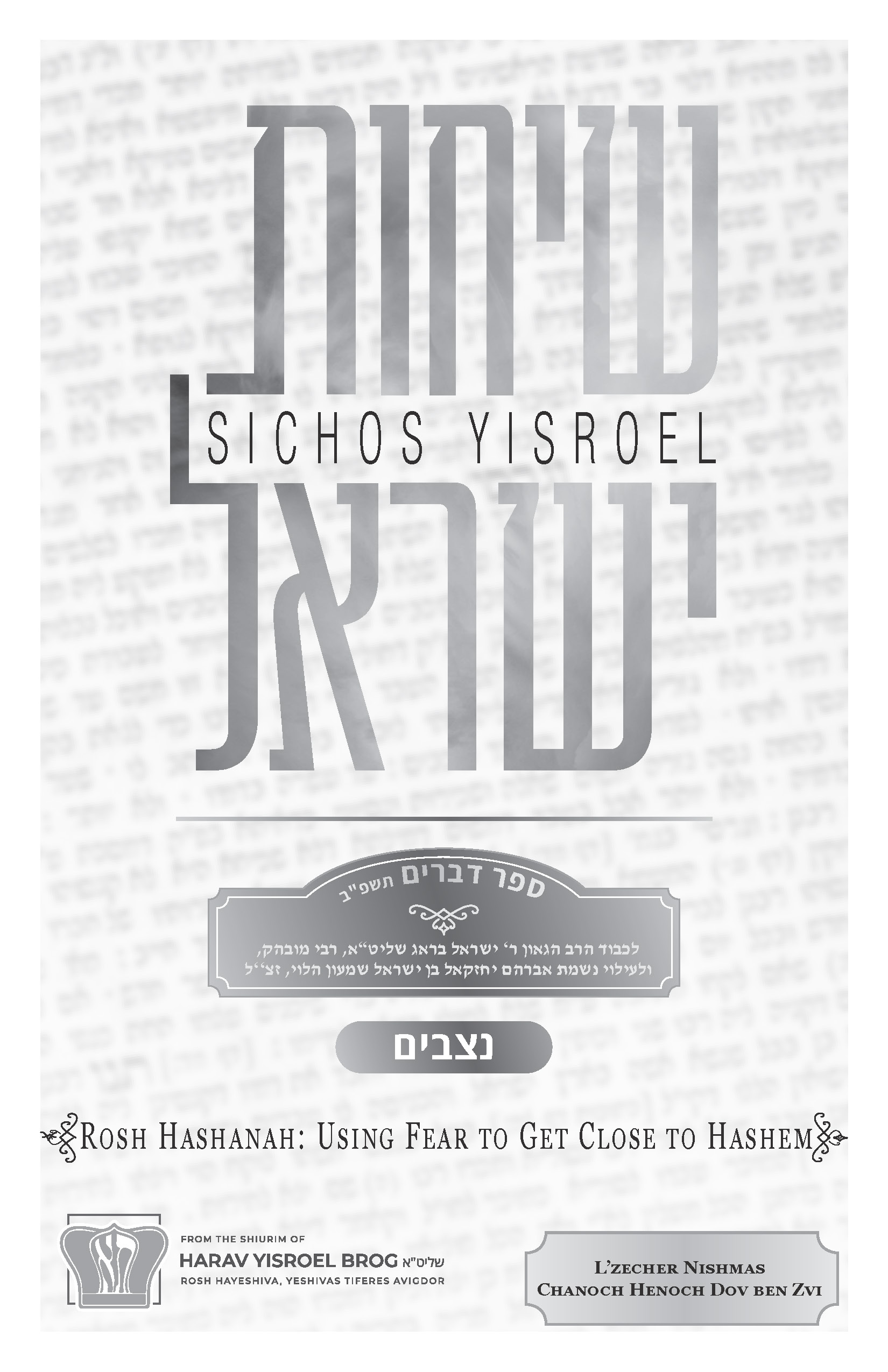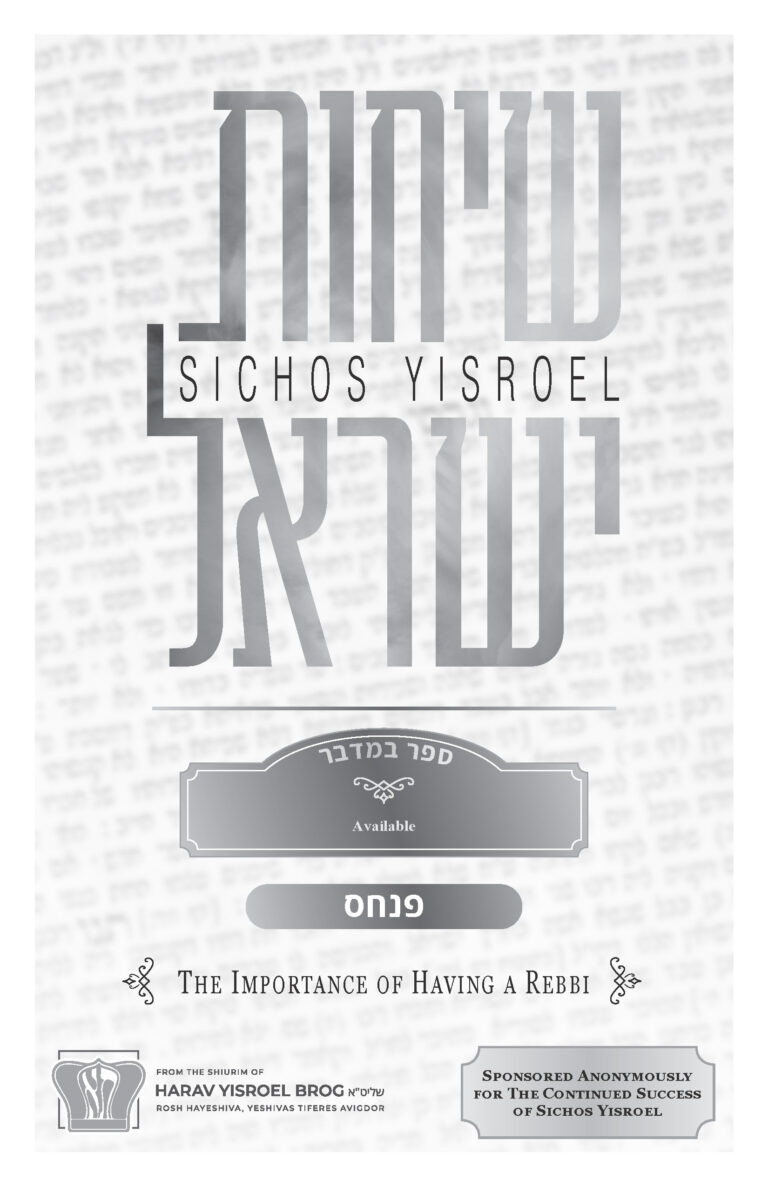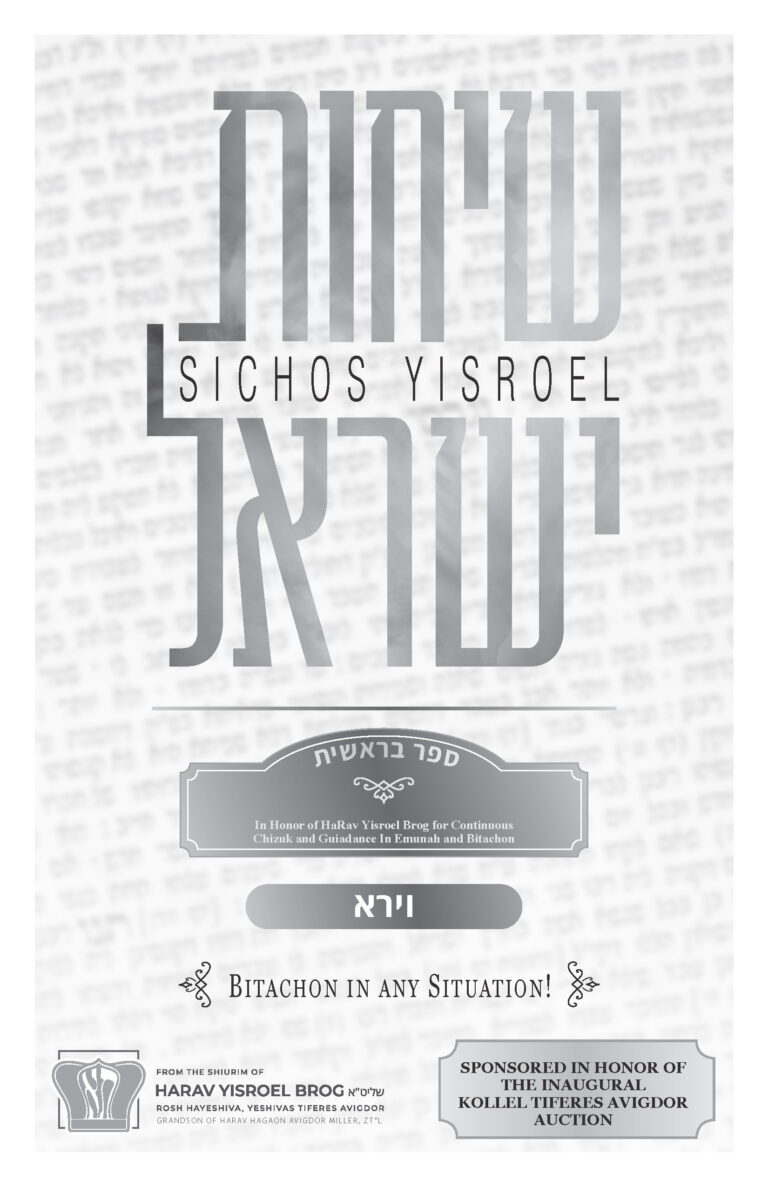Nitzavim 5782 – Rosh Hashanah: Using Fear to Get Close to Hashem
Sponsored
L’zecher Nishmas Chanoch Henoch Dov ben Zvi
Consider sponsoring a shiur
Visit YTATorah.org
Shiur presented in 5778
A Strange Appeasement
In this week’s parshah Moshe Rabeinu is on the last day of his life and he calls Klal Yisrael together and says אתם נצבים היום – you stand this day (Devarim 29:9). Rashi says מלמד, this teaches us, שכנסם משה לפני הקב”ה ביום מותו להכניסם בברית – that Moshe assembled them in the presence of Hashem on the day of his death in order to initiate them into a covenant with Him. Rashi (ibid 29:12) cites a Chazal: לפי ששמעו ישראל מאה קללות חסר שתים, Klal Yisrael heard 98 klalos,besides for the 49 that were mentioned in Toras Kohanim, and in response to hearing these klalos – they weren’t full of smiles – it says הוריקו פניהם, their faces changed colors, ואמרו, and they said, מי יוכל לעמוד באלו, who is able to withstand this? Who can handle this? So התחיל משה לפייסם, Moshe started to appease them and he told them, “Listen boys, הרבה הכעסתם למקום, you’ve angered Hashem many times, ולא עשה אתכם כלייה, He did not destroy you. והרי אתם קיימים לפניו, you see you are still standing on your two feet! You’re still around!”
So Moshe Rabeinu appeased Klal Yisrael. The question is what is the explanation of this appeasement. I mean, it almost sounds like he’s telling them that the purpose of the tochachah (rebuke) – of Hashem giving or telling them about the possible klalos that will befall Klal Yisrael – is to instill in Klal Yisrael pachad, and it taka served its purpose. They became full of pachad to the degree that their faces changed color. But then what does Moshe Rabeinu come and tell them next? “Don’t worry about it guys. See, it’s not as bad as you think, because, look, you’re still here even though you angered Hashem.” So what is Moshe telling them? On the surface, it sounds like he’s telling them that you could sin and you won’t get punished! Is that what Moshe is telling them?! Was the tochachah said for nothing?! So, it seems there’s some kind of a balance here. What is this balance?
The “Westest” Outlook on the Crime and Punishment
Now, the first thing you have to know is what is the Torah’s view on onshim (punishments) and yesurim (suffering)? In today’s world, the western society, they have a very negative view of onshim and yesurim. They don’t like pachad and yesurim. They like love. They’re into the love thing. Ahavah. You do bad? No sweat. Go to Uman, grow a pair of peyos, hide them under your yarmulke. When the time comes, Rav Nachman is going to come down, grab you by those swinging peyos and he’s going to pull you out of the deepest Gehinom and you’re good to go. Just keep coming back every year for the visit. It’s a pelah. We live in a society that goes for that stuff. People actually believe in this rubbish, this nonsense. No one is getting you out of Gehinom except yourself: מַעֲשֶׂיךָ יְקָרְבוּךָ וּמַעֲשֶׂיךָ יְרַחֲקוּךָ – your own deeds will cause you to be near, and your own deeds will cause you to be far (Eduyos 5:7). Your actions are going to be what gets you out and what gets you in.
But really it’s an uncomfortable subject to speak about. Should you tell children, or even adults that there’s a concept of onshim, and that there are consequences? Why don’t you emphasize the positive instead? Positive is so much nicer, so much more palatable. People like to hear the positive. “Everybody is going to make it!” But people don’t realize that there is a place in the Torah for this. The Torah gave us 98 klalos in one tochachah and half a boatload of klalos in Sefer Vayikra. So let’s analyze what the function of onshim is in the world, as we know it.
Every society administers punishments. In Singapore, for example, if you throw bubble gum on the floor you get caned. And they don’t cane you with a toothpick. They cane you with a big bamboo rod. They lay you down, and they smash you many times on your bare back. As a matter of fact, that’s why they don’t allow bubble gum in the country. There’s no gum sold in any store in that country! If you want to make a fortune, go to that country, bring a few packs of bubblegum. Maybe you can sell it on the street behind some building. Why? Some guy decided he doesn’t want to have bubblegum on his streets. A pelah.
In the gantze universe there are onshim. Generally, onshim come for one of two purposes. One is to take some revenge. A person misbehaved so they’ve got to pay a price for that. It’s not a tachlis. It’s not for any specific purpose. Or sometimes they give onshim in order to warn the guy and to frighten the guy, instill fear in him, that he shouldn’t repeat the same behavior.
Yesurim is a Bris
What is the function of onshim by Hashem? Now, there are actually two chalakim (parts) of onshim. There’s one telling a human being about the onshim and then there’s administering the onshim. You have to know first, that onshim are a fundamental crucial part of the relationship between Hashem and Klal Yisrael. Now listen to how it works.
In the Torah, the onshim are called divrei habris. It’s a covenant. The words of the tochachah, as the Torah tells us at the end of this week’s parshah, describe onshim as a bris. Now let’s understand, who is the bris between? The bris is between Hashem and Klal Yisrael. Is a bris a good thing or not a good thing? What would you say a bris is generally a sign of? You would say it’s a good thing. What does a bris signify? It signifies a relationship, a kesher. A bris is a covenant. A covenant is like a pact that two people make between each other. If the police threaten you, they don’t make a pact with you. They give you a warning: if you misbehave, either “click it or ticket.” That’s not a bris. That’s a ticket. On the other hand, all these klalos are called a bris.
The gemara says in Brachos (5b)נאמרה ברית ביסורים.[i] It’s one of the three brisos that Hakadosh Baruch Hu made with Klal Yisrael. The Rambam in the end of Hilchos Milah brings down the three brisos.[ii] Yesurim is one of them. Just like when Hashem told us to do a bris milah it was a covenant – as it was a pact between Klal Yisrael and Hashem – so, too, when He told us about the yesurim and He laid them out for us, that itself was a bris.
What is the pshat in all of this? Hashem wants to make a kesher, and the way Hashem makes that kesher is that Hashem tells us how we should behave. That’s good for us, and we accept that and carry out His prescribed behavior. We follow His dictates. That enables us to have a kesher. So the whole purpose of yesurim is to serve as glue. It’s to weaken the power of the yetzer hara. How can I listen to the yetzer hara with whom I don’t have a bris? (I don’t have a bris with my yetzer hara, hopefully. Some people seem to have a bris with the yetzer hara. You’re not supposed to have a bris with the yetzer hara. The yetzer hara tells you, ‘I’m your friend,’ but you’re only supposed to have a bris with Hashem). So Hashem gives you yesurim in order to strengthen your relationship with Him and to keep the relationship tight. The tachlis, as it says in the passuk, אז יכנע לבבם הערל (Vayikra 26:41), their hearts, their uncircumcised hearts will become humbled, nichna to Hashem.
There’s No Such Thing as a Free Lunch
Many times, a person comes to a situation where he’s not impressed by Hashem. He’s not impressed by the ratzon of Hashem. You know what that’s called? That’s called תמהון לבב, a “numbness of heart.” (Devarim 28:28).Rashi says that means אוטם הלב. His lev becomes “stuffed.” That means he hears what he is being told, but he doesn’t take it to heart. He doesn’t change. He’s not motivated to make any changes. You know how many times I have asked people who have gone off the derech and do aveiros, “Do you think you’re not going to pay a price for every single aveirah that you do?”
There was once a story with the Vilna Gaon (Sefer Keser Rosh, Ma’amar 5, siman 11) where he went into an inn, and saw a fellow who looked like a rough type of fellow. He didn’t look like an erliche Yid, and he ordered a drink of beer. The Vilna Gaon told him that you should know you have to make a brachah. The guy laughed and said, “Do you know how many problems I’ve got to pay for that are more serious sins before they would take me to account for the brachah.” The Gaon started to list them. “You’re going to be held responsible for everything that passes your lips without a brachah. You’re going to be charged for every tefilah that you didn’t say, for every tefillin that you didn’t wear. For every mitzvah of talmud Torah that you didn’t learn, you’re going to be held responsible.” He listed mamash a terrible cheshbon. The guy said, “What? I thought I’m frei.”The Gaon said, “Who freed you?”
That’s what people think today. “I’m not frum so why do I need to keep these mitzvos?” People think they could exempt themselves from responsibilities. The word frei means free. You should know that no one is free. You act like you’re free but you’re not free, and you have to know that when a person gets to that sense, to that feeling where he doesn’t feel anything anymore, he requires something to connect him to Hakadosh Baruch Hu. He requires middas harachamim. Hashem, in His mercy, instead of letting you go, brings yesurim upon you. The yesurim are supposed to soften your connection with the yetzer hara and open up your heart to let the right things penetrate, allowing you to do what you have to do. Yesurim is one thing that speaks to everybody. It’s amazing.
No Atheist in the Foxhole
I always tell the following story. There was a lady. She was Jewish, but her father gave her the name Kathy, a real goyishe name. She was a total anti-Semite, totally anti-Yiddishkeit, anti anything religious and anti Hashem. Maybe it wasn’t totally her fault. She had a father who was a rasha gamur. He was the epitome of cheit, and he was a kofer bakol. He changed his first name and last name to a totally goyishe name. He was a great inventor. I was mekarev her husband who was a very wonderful fellow and a tremendous doctor, a world famous doctor. I learned with him, and I was mekarev him. He would have become frum if not for his wife. He started eating on paper plates in his house. It was very rough. He was a big mentsch, emes a fineh mentsch.
Then one day I get a call. I say, “Who is this?” “It’s Kathy so and so.” I say, “Yes,” and then I chapped it was his wife. It was 6:30 in the morning. I said, “What can I do for you?” She said, “I’m going through a surgery today. They found a lump, and it doesn’t look good. My husband gave me a siddur. I’ve got that prayer book in my hand. What page should I say? I want to say something from the prayer book before I go into the operation.” I told her, “Kathy, now is not the time to get religious on me. It doesn’t speak to you. You don’t relate to it.” She said, “No, no, but just in case, I wanted to say a prayer, what would I say?” I said, “I guess it does prove the old saying there ‘ain’t no atheist in a foxhole.’” (When you’re in a foxhole and the bullets are whizzing over your ears, everybody screams Shema Yisrael for some funny reason). I said, “Are you sure you want to do this? This is not just a game.” She said, “No, no, no, I really want to do this.” I told her what number to open up the page to. I told her what page to say and what to read in Tehillim. Then baruch Hashem it all worked out.
About two months later, I happened to bump into her and her husband and I reminded her. I said, “You know that was a close call, but it was a tremendous elevation. It was a lift.” She said, “Rabbi, don’t take me seriously. That was just a weak moment. Ah, it’s all nonsense.” I said, “Kathy, don’t say that because the day is going to come where it’s not going to be a weak moment. If you accept now, you’ll make it. If not…”
I bided my time. I waited. It says, wait patiently רק בעיניך תביט ושלמת רשעים תראה – you will see it with your eyes, you will witness the punishment of the wicked (Tehillim 91:8). And then the day came, years later, maybe 15 years later. She was in good shape. She thought she was on top of the world. Then, one day her heart started giving her trouble. She had a sickness in which Hashem took apart her heart piece by piece! I never heard of such a thing before. Her husband called me up. We had no shaychus for about ten years, and then he called me and said, “You know we’re going through a very tough time?” I said, “Is she conscious?” He told me the first part of her heart just gave out, but they think they can fix it. I said, “It’s a wake up call to you. Tell your wife now it’s teshuvah time, elevation time.” She said this time she wasn’t going to play that same game again.
A week later he called again to tell me that another part of her heart fell apart. He kept me updated. I said, “Wake her up before it’s too late.” He said, “I can’t.” He was a very aidel guy. Then the third part and then the fourth part. She died an awful, terrible death. What a waste because Hashem tried to lift her up and Hashem gave her a chance, and Hashem was saying, “Even you, who lived a goyishe life (she wasn’t that old), I love you,” Hashem said. “We have a bris. Whether you acknowledge the pact or not, everybody is included in this pact, as the passuk says ‘from the lowest woodchopper to the water carrier,’ you can do teshuvah. You will get to know Me. That’s the covenant. You can’t escape that.”
A Warning, Not a Curse
So Moshe Rabeinu tells Klal Yisrael as follows. He says, “You think that Hashem gave you all these klalos?He didn’t give you the klalos. They’re not klalos.”A warning is not a klalah. A warning is saying to somebody, “Don’t do x, y, z because this is what could happen.” What you’re supposed to do is tighten up your commitment and resolve to serve Hashem.
I just got a call from a young man who got into some serious trouble. I’ve been screaming at this guy for years and begging him to wake up, but he’s smarter than everybody under the sun. I made him frum many years ago. I sent him to Eretz Yisrael. I supported him. He got married. I helped him with his wedding. He was an ornery character, but he’s a Yid, so I felt Hashem wanted me to help him. Then he had a bunch of kids. This past Pesach at the seder night, he got angry at his child, and he gave his kid a whack. He told me it was a love tap, but his kid left the house and ran to a rebbi‘s house. The next thing he knows, his kid was taken away from him. All his kids were taken away from him. His wife left him. They were in my house a number of times. His wife looked like a very quiet timid little person. She was ten years younger than him. He basically took her out of the crib. She couldn’t speak English very well. He met her in Eretz Yisrael. He had good control over her. So now, his wife left him, and his whole life collapsed.
He started to call me, asking me that I should help him get his family back. I looked into the story and said, “Listen, Hashem finally called in the chips. I warned you a hundred times to be a mentsch.”He was smarter than every rav. The guy sent me, I would say without an exaggeration, 500 to 1000 texts. I’m talking about getting texts 24 hours a day from him. There were French texts. There were Russian texts. I was educated in words I didn’t know existed. I told him, “My dear friend, you are whacked. You are not normal. There is something seriously psychiatrically incorrect up there. Your brain doesn’t work. You’re not getting your kids back.” He went to the police. The police arrested him. They looked into the story. They heard that he beat his kid, so they arrested him. Then he went back and said, “I want my wife back. Some rav kidnapped my wife.” The police arrested him a second time for abusing his wife. The guy was pashut not well. I told him, “Check yourself into psychiatric care. Get it now. Lock yourself up.” I said, “Why don’t you try locking yourself up?”
So, he called me again. I said, “Yes, how can I help you?” I was getting ready for the barrage. He called me from a different number, so I didn’t know it was him. Otherwise, I would never have answered. He said, “I want to ask you for mechilah as we’re coming to Rosh Hashanah. I started up with so many people.” He was very humble which was unusual for him. He was obviously heavily medicated. I could sense that right away. I said, “Did you check yourself in?” He said, “For forty days I was in the psychiatric ward and I was diagnosed with extreme bipolar disorder. I haven’t seen my children, and I haven’t seen my wife. There’s a ‘no contact’ clause.” He told me how his whole life collapsed totally.
Hashem warned him multiple times. Hashem loves that guy too. He’s Hashem’s child. Hashem made him born Jewish. The guy told me, “Say three times ‘machul lach.’” I said, “I’m mochel you, I’m mochel you, I’m mochel you.” He said, “I’m amazed you could do that considering everything I did.” I said, “Are you actually aware of what you did?” He said, “Oh, I saved every text.” I said, “Nebach, nebach. You have no life now. Who takes care of you?” He said, “My old father. My old father lives not far from me. He helps me.” Nebach.
But Hashem gave him a lot of warnings along the way. I kept on telling him, “Hashem is warning you! Hashem is warning you! Hashem loves you. Get the message! Take the message!”
Using Fear to Get Connected on Rosh Hashanah
Moshe Rabeinu tells Klal Yisrael, “If you get the message, you don’t have to worry about the klalos!”If they would have stood there with a big smile on their faces after hearing all these klalos and said the following: “Ah, the Ribono Shel Olam is not going to take us out! He’s not going to destroy the Yidden. We’re good to go; שלום יהיה לי, everything is going to be just fine with us,” then Moshe Rabeinu would have said to them, “You guys better get scared.” But when he saw that the Yidden took the message and their faces changed colors and they felt the pachad and that they understood that Hashem meant business – that was the whole purpose of the onshim! Now you don’t need any onshim bepoel. That’s what the Torah is telling us.
You know that we are a few weeks away from Rosh Hashanah, and everybody wants to come to Hashem with a ‘clean slate.’ Everybody wants to come to Hashem and say, “Hakodosh Baruch Hu, please give me another shot.” But if you have no pachad and you’re calm, that means you’re not connected with Hashem and you could expect a big ‘phone call.’ You can expect Hashem to wake you up. Hashem is going to say to you, “You didn’t want a kesher with Me? You just want Me to give you another year to continue in your bad ways. You just want Me to let you go on that Slip n’ Slide. (There’s a kid’s game called Slip n’ Slide. You know what that is? Have you ever seen that? You put water on it and you jump on it and you slip and slide. What most people want from Hashem is to play Slip n’ Slide. Hashem, could I get another year to ‘slip’ past You?) That’s not called having a kesher with Hashem. If you want a kesher with Hashem, you’ve got to come to Hashem with some fear. You’ve got to come to Hashem with some awareness that, “Hashem I do take You seriously. I understand that for every action I do which is not according to Your will, I have to pay for it.” There is a reaction. You can’t ignore Hashem. There’s no way to throw Hashem under the bus. Understand that. For every aveirah you do, you’re going to have to pay the price.
Yesurim Are a Big Bear Hug
Now, if a person has done aveiros, he created mazikim, he created mekatragim. How do you get rid of them? You know how? By telling Hashem, “I’m guilty and I’m sorry.” You have to be modeh to Hashem. You have to come to Hashem and say, “Hashem, I’m not giving excuses. Hashem, I did take You lightly and I know You want to have a kesher with Me and I’m here to have a kesher with you.” If a person could actually demonstrate to Hashem that he wants to change, he wants to turn over a clean page, the punishments and the onshim that he deserved will be dissipated and minimized. Do you know why? Because when you want to really have a relationship with Hashem, you say, “Hashem, I’m really sorry for what I did.” You express your regret for what you did.
To say: “Now that I’m sorry for what I did, let me do it another time and get away with it” – that’s not going to work. Everybody is going to pay a price. I’m telling you, you’ve got to pay that price. Hashem is not going to let you go. All the yesurim that you do get in your life when Hashem squeezes you, let me tell you, it is a bear hug. You don’t understand why and how, but what it is, is Hashem telling you, “You’re not aligned with Me.” You have to understand and think about what’s not good to do in the eyes of Hashem.
Admitting Our Faults
Now the more a person admits, the better off he will be. Rav Yerucham Levovitz, zt”l, once said to his talmidim, “I’m going to reveal to you a sod gadol, a very big secret.”Now listen to this secret because it’s a big thing. He says, the gemora, in multiple places states a big principle of modeh bekenas patur – someone who admits to a fine in court is excused from paying it, even if witnesses come later and testify against him.So let’s say a guy comes to the court and says to the court, “I did the crime, I ripped the guy off” – he doesn’t have to pay kefel (double) anymore. You know when it’s going to cost him though? אשר ירשיעון אלקים (Shemos 22:8), when the court has to find him guilty, meaning when he didn’t acknowledge his guilt, he was trying to hide it, then he’s going to pay kefel, he’s going to pay double, or he’s going to pay daled vehei, that’s four and five times the amount of his original theft. But if he’s modeh bekenas, he’s patur.
Satan has lots of kitrugim on us, he has lots of stuff on us. He knows every time you went on a smartphone. He knows every time you looked at something you weren’t supposed to look at. He knows every time you didn’t learn and every time you didn’t daven and every time you didn’t behave properly. If Satan prosecutes you, then you’re in tzaros. But if you come and you say to Hashem, “I’m modeh, I’m modeh bekenas,”the Satan doesn’t like that. You say to Hashem, “I’m modeh and I want to do teshuvah for what I did.” Modeh bekenas is patur.
You can’t use it as a loophole though. It doesn’t work if a guy says אחטא ואשוב – I will sin and then will repent (Mishna Yoma 8:9). You’ve got to really feel humbled. And if Hashem gives you a little knock because you’re arrogant and you don’t want to be a modeh, you are supposed to get the message. But if you don’t, you’ll have to pay the price. If you say, “I don’t have to be modeh to anything. I’m doing what makes me happy. I’m acting like I am always right. I’m not to blame for anything. Other people are guilty. Hashem it’s Your fault. You made me like this. You made me with this yetzer hara.” Whatever you’re going to say. My friend, if you talk like that, you’re going to pay the price. A very serious price! Usually every time, two weeks before the end of the year, I see Hashem’s hand. He was patient for the whole year and then “boom.”
The Best “Insurance” Policy
Just before Shabbos a young man called, a yungerman, crying, very, very broken up. I couldn’t hear him. I said, “What’s the problem?” He finally said that he’s 27 years old and he lost control of his feet. He lost the usage of his feet! I said, “You want to tell me how it happened?” He said, “I went to Florida with my wife. I was in Florida. I have a baby. We went with the baby to Florida for a couple of days bein hazmanim. One day, I woke up and my feet weren’t there. I couldn’t move them.” They rushed him to the hospital over there. I said, “Were you ever sickly?” He told me, “I’m the picture of health.” I said, “So what happened?” They put him in the hospital there for a bunch of days and then they couldn’t help him. They flew him up to his home state. The guy is ois mentsch. “My life is over. It’s very scary.” I told him, “Your life is not over, but Hashem is telling you something. Florida is not for you. ‘Come back to Me,’ Hashem says. ‘Wrong direction. You’ve got to come to Me.’”
A person has to know, if you run away from Hashem, you pay a price for it. There’s no such thing as running away from Hashem. I see it happening all the time. I’ve gotten so many calls in the last few days, mind-boggling calls. Not stam. Otherwise healthy people. Everybody thinks, “Not me. I don’t belong to that group. It happens to everybody else. It doesn’t happen to me.” You’ve got to get with the program, Rabosai! Every time you hear it happens to somebody else, you get a wake up call. They lost everything. They lost their money. They lost this. They lost that. All kinds of stories. Hashem is talking to all of us. “Come back, My child.” Think of the onshim before they come to you so you avoid having Hashem finding it necessary to send them to you. If they come to you, run back to Hashem as quickly as you can. And if you can’t walk, crawl back to Hashem.
Hakadosh Baruch Hu should help us all think about this lesson, the last lesson that Moshe taught Klal Yisrael. He didn’t give them ‘feel good Torah.’ You know, it’s amazing to me. You’d think that he would say to them, “My children, I love you. My children, it was wonderful being your rebbi. My boys, I love you.” Instead, he said, “I want to tell you something. Remember, if you forget the kesher with Hashem, this is what’s going to happen to you and I don’t want it to happen to you.” And they got all nervous, so Moshe told them, “I see that you got the message! I see from your faces you’ve taken it in! You’ve absorbed the message! That’s the biggest insurance and the biggest guarantee you’re not going to get the onshim anymore.” Had they blown him off, and said, “Ah, you think we’re impressed?!” he would not have appeased them.
The More You Know, The More You Have to Keep
I can’t tell you how many people have told me that line. “You think I’m impressed?” There was a young man whom I brought up in my house. Somebody spoke to me this Shabbos about him. He said to me, “Whatever happened to that kid you brought up?” This fellow revealed an interesting thing to me. As a quick background, I adopted this kid from off the street. He was part of a gang in the street. The kid turned into something very, very special. It’s a long story. I’m not going to tell you the story now. Eventually, he went off the derech. So this fellow whom I met on Shabbos tells me, “You know, I really feel terrible, because I was his roommate in Camp Kol Torah. He was a young boy at the time, and told me that he needed some money to get on a bus to go home to his home city of Detroit. He told me, ‘I’ll come back tomorrow. Can you give me the money?’ It was all the money I had to spend in camp. I gave it to him. But he never came back.”
Eventually, I met the boy again. He went off the derech big time. He told me, “You don’t know what I was exposed to. You don’t know what I saw.” I said, “Shlomo, I don’t care what you saw. I know what you were. Youwere here. You shteiged os moradig. You were a top bochur in Yeshivah! Rav Gifter thought you’re going to become an adam gadol! People thought about you unbelievable! I thought you were going to become great. I want to tell you, Shlomo, make sure you always have a connection with Hashem, so that Hashem has a reason to keep you alive. Don’t think that because other people are alive and they have no connection, that that’s your insurance. You have a connection with Hashem and you know it. And if you’re going to sever that connection, you’re going to cut that connection, you’re going to forfeit your right to live.” And he did. He got shot in a live fire exercise in the US Army. Hashem took him out. You know what Hashem said? “Mutav, better he should die young than to die an alter chatas and an alter rasha.”It was very sad when he died. I used to always warn him on the phone, “Shlomo, make sure you always keep some connection with Hashem and don’t forget Him, because if you do, it’s going to be very expensive.” Rabbosai, you have to understand that the more you know, the more responsible you are to Hashem. Keep the connection. Yesurim are there to bring us back to Hashem and to rebuild the connection that we’ve lost. Let’s rebuild our connection to Hakodosh Boruch Hu, and let’s always stay close to Him. Let’s acknowledge our missteps and sincerely tell Hashem in these last remaining days of Elul, “I want to come back to You.” And if we do, we can avoid any unpleasant reminders. Have a great Yom Tov!
[i] דאמר רבי שמעון בן לקיש: נאמר ״ברית״ במלח, ונאמר ״ברית״ ביסורין, נאמר ״ברית״ במלח, דכתיב: ״ולא תשבית מלח ברית״ ונאמר ״ברית״ ביסורין, דכתיב: ״אלה דברי הברית״, מה ״ברית״ האמור במלח – מלח ממתקת את הבשר, אף ״ברית״ האמור ביסורין – יסורין ממרקין כל עונותיו של אדם. [תניא, רבי שמעון בן יוחאי אומר: שלש מתנות טובות נתן הקדוש ברוך הוא לישראל, וכולן לא נתנן אלא על ידי יסורין, אלו הן: תורה וארץ ישראל והעולם הבא. תורה מנין – שנאמר: ״אשרי הגבר אשר תיסרנו יה ומתורתך תלמדנו״. ארץ ישראל, דכתיב: ״כי כאשר ייסר איש את בנו ה׳ אלהיך מיסרך״, וכתיב בתריה: ״כי ה׳ אלהיך מביאך אל ארץ טובה״. העולם הבא, דכתיב: ״כי נר מצוה ותורה אור ודרך חיים תוכחות מוסר״. תני תנא קמיה דרבי יוחנן: כל העוסק בתורה ובגמילות חסדים.]
[ii] בוא וראה כמה חמורה מילה שלא נתלה למשה רבנו עליה אפלו שעה אחת אף על פי שהיה בדרך. וכל מצות התורה נכרתו עליהן שלש בריתות. שנאמר (דברים כח סט) ״אלה דברי הברית אשר צוה ה׳״, (דברים כח סט) ״מלבד הברית אשר כרת אתם בחרב״. ושם הוא אומר (דברים כט ט) ״אתם נצבים היום כלכם״ (דברים כט יא) ״לעברך בברית ה׳ אלקיך״, הרי שלש בריתות, וכו’ (משנה תורה, הלכות מילה ג׳)






